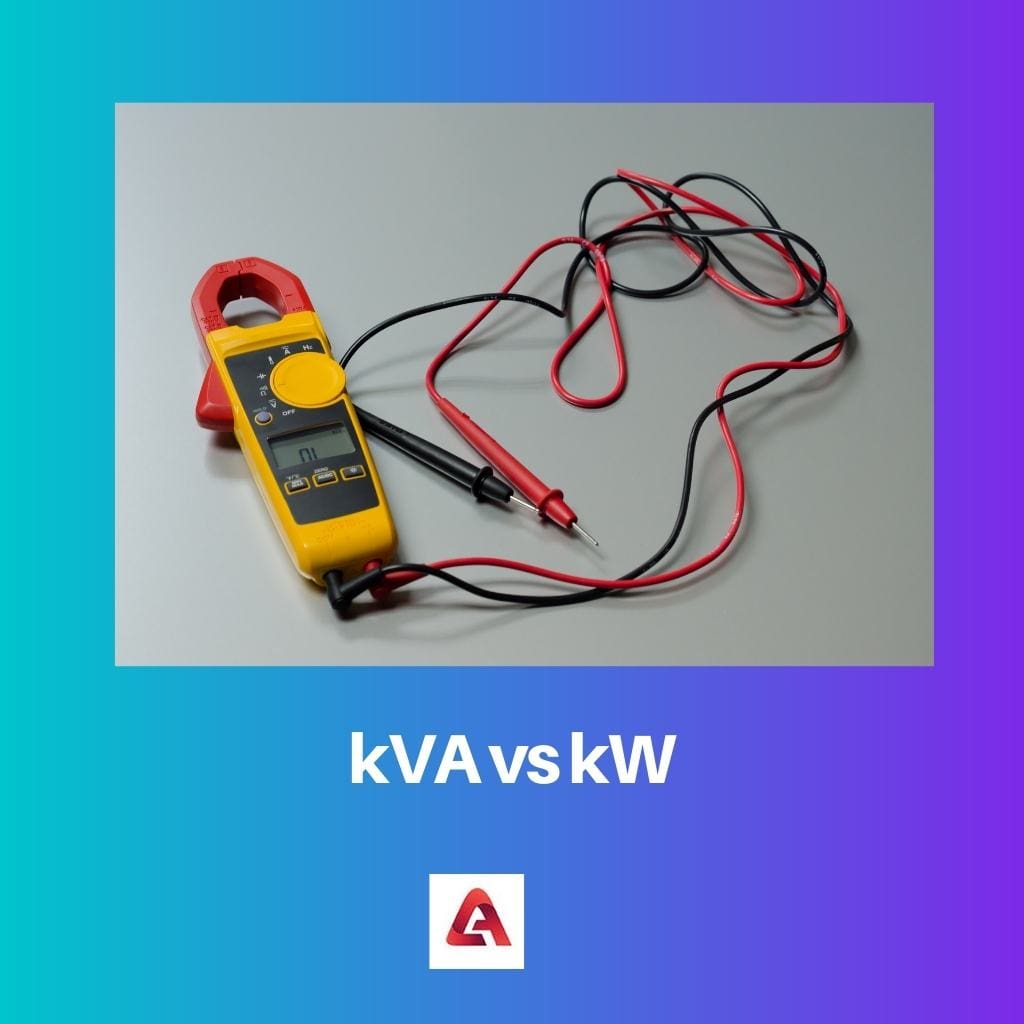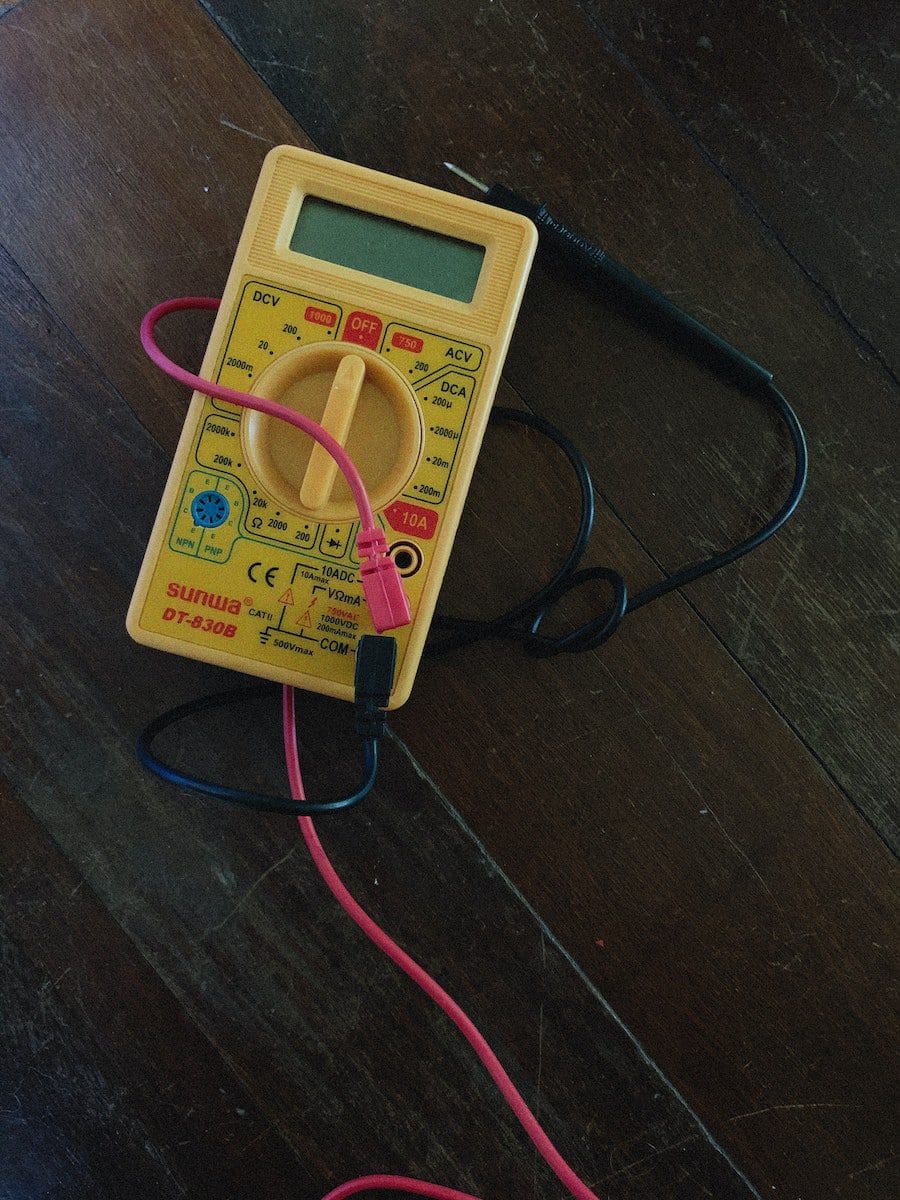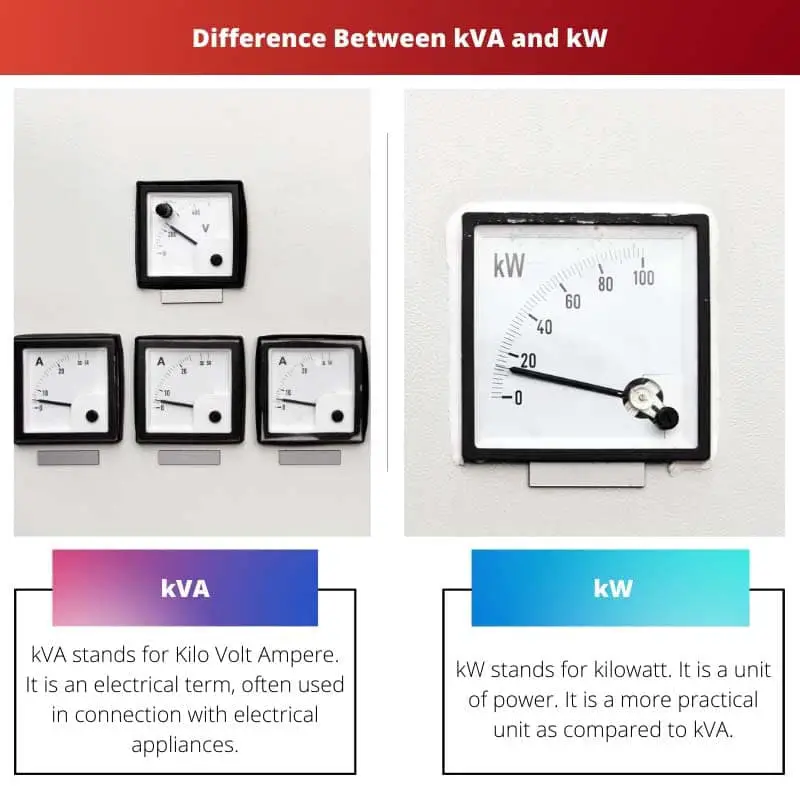Both kVA and kW are terms associated with electrical appliances and their power, specifically. They both denote the power of an appliance and can easily be found on the appliance’s label.
Users confuse them as the same, but they have certain differences.
Key Takeaways
- kVA and kW are units of electrical power measurement.
- The main difference between the two is their calculation – kVA is a measure of apparent power, while kW is a measure of real power.
- While both are important in understanding electrical power systems, kW is used for measuring the actual power consumption of devices, while kVA is used for sizing electrical equipment.
kVA vs kW
kVA (kilovolt-ampere) represents the total amount of power a device or system can handle, including real power (kW) and reactive power. The kW (kilowatt) unit of real power represents the actual power consumed or produced by a device or system.

In a 100% efficient system, kVA is equal to kW. But in non-ideal cases, kVA can be converted to kW using certain formulas and determining the power factor, which represents the appliance’s electrical efficiency.
Comparison Table
| Parameter of Comparison | kVA | kW |
|---|---|---|
| Reference | kVA is referred to as the apparent power. | kW is referred to as the actual power. |
| Expansion | kVA stands for kilo volt-ampere. | Kw stands for kilowatt. |
| Concept | kVA is an ideal or theoretical concept. | kW is a practical concept and is equal to Kva only if all the conditions are completely ideal. |
| Definition | kVA is referred to as the total amount of power in use in a system. | kW is the actual power being utilised for the system’s functioning. |
| Conversion | kVA can be converted to kW by multiplying it with the power factor of an electrical appliance or system. | kW can be converted to kVA by dividing it by the power factor of an electrical appliance or system. |
What is kVA?
kVA stands for Kilo Volt Ampere. It is an electrical term used in connection with electrical appliances.
kVA is mainly associated with the power and utility of an electrical appliance or system. It can be easily found on the labels of most of the appliances or electrical systems.
kVA refers to the apparent power of an electrical appliance or system. It is the total amount of power in use in a system.
This is easy to find out and is an ideal concept. Because, in practice, a lot of factors reduce the amount of power that is supposed to be utilized by the system.
The actual power output will always be less than, as mentioned in the kVA. As a theoretical concept, however, it has great significance in calculating and designing certain electrical systems.
kVA can be easily converted into kW, the actual power output and its more practical counterpart by a simple formula. By determining the power factor of an appliance or electrical system, it can be multiplied by the kVA of the system to find out the actual amount of output the system gives or its kW.

What is kW?
kW stands for kilowatt. It is a unit of power.
It is a more practical unit as compared to kVA. It has useful applications in ideal as well as non-ideal conditions.
The power is available to do work and produce an output, while kVA is not available at its maximum since a part of it is expended. This unit, kW, is an actual measure of how much the electrical appliance does valid work.
In a DC circuit, kW is the same as kVA. In an AC circuit, however, the kW is less than kVA and can be converted to the same by taking the power factor into count.
This is also based on the inhibition rate in the circuit.
Under ideal conditions, kW is the same as kVA. However, in real-life practical applications, this never happens.
A part of the energy and power supplied is never utilized. Thus, kW measures how much power can be utilized and converted into useful output with the remaining amount available.

Main Differences Between kVA and kW
- Both kVA and kW are power units and determine how much useful work an electrical appliance or electrical system does. However, kVA states the apparent power while kW states the actual power.
- kVA stands for kilo volt-ampere, while kW stands for kilowatt. However, These units of the same quantity represent slightly different aspects.
- Both determine the amount of work an electrical system does and the amount of power output supplied. But while kVA is a measure of the theoretical power output of the appliance in ideal conditions, kW is a measure of the actual power output of the system in non-ideal practical conditions, as only a portion of the power is available in this case.
- kVA is a theoretical concept associated with an appliance, but kW is a practical concept and a real measure of the power output of an electrical system.
- kVA can be converted to kW by multiplying the power factor with it, while kW can be converted to kVA by dividing it by the power factor.

- https://www.sciencedirect.com/science/article/pii/S1364032114004651
- https://ieeexplore.ieee.org/abstract/document/883137/

This article really helps in understanding the practical and theoretical concepts of kVA and kW.
There seems to be a bit of confusion among users about these two terms. It’s good to have clarification.
The article is quite clear and helpful.
I appreciate the detailed comparison table highlighting the distinctions between kVA and kW in an electrical system.
This is a helpful guide for anyone trying to understand the difference between kVA and kW. Thanks for breaking it down in such a comprehensive way.
The comparisons and explanations make it easier to differentiate between kVA and kW.
The practical application of kW and the theoretical concept of kVA have been lucidly explained. Very informative!
The article is well-researched and presented in a reader-friendly manner. Good read for anyone trying to comprehend these terms.
This is a great article to understand the difference between kVA and kW. It’s more useful for non-technical people to grasp these concepts differently.
I totally agree!
Absolutely, it’s very informative.
The explanation about apparent power and actual power under kVA and kW is well articulated.
Yes, the details provided are quite insightful.
A well-constructed and insightful piece to educate readers on the key differences between kVA and kW. Well done!